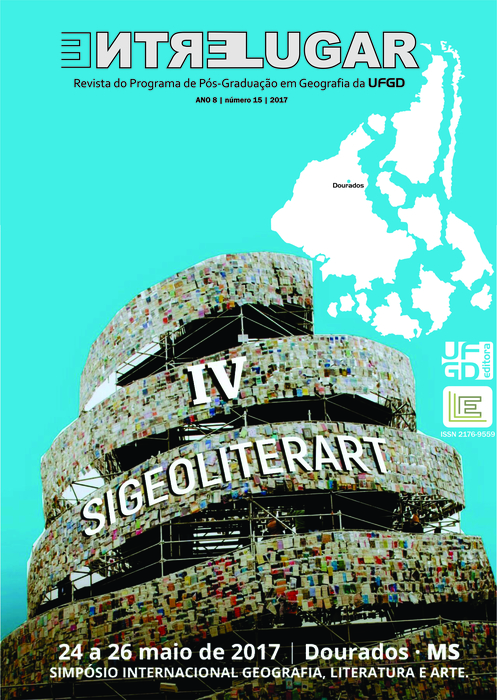The reading of José J. Veiga's work and the construction of geographical knowledge in fundamental teaching
DOI:
https://doi.org/10.30612/el.v8i15.7299Keywords:
Reading practice, Youth, School environment, Geography, Literature.Abstract
Reading is a social practice saturated with a space-time meaning and is modified
according to the new social contents and the socio-spatial trajectories of the readers. In a society accented by the discourse of knowledge, science and technology, mastering certain language codes and practicing associative and cumulative reading has become essential. All this suggests problematizing the reading practices, once this ability is struck by a world intersected by the fragmentation of daily life, by the strength of networks and consumption levy, especially in metropolitan areas. Such indications suggest that contemporary youth develops new experiences with the universe of reading and writing. With this in mind, it is proposed to interpret the relationship between Geography and Literature, through the analysis of the geographic reading that the students of the Elementary School of the Center of Education and Research Applied to Education, of the Federal University of Goiás (CEPAE/UFG) “Th e Lost Machine”, by José J. Veiga. Th e methodology used consisted in the utilization of reading and writing activity in the classroom, with later analysis of the texts produced by the students.
Downloads
References
AURORA NETA, Maria. Jovens leituras e jovens leitores. In.: SANTOS, A. P. et al. Leitura, Espaço e Sujeito. Goiânia: FIC/FUNAPE/LABOTER, 2014.
BRAGA, Helaine da Costa; ALMEIDA, Maria Geralda. A interface da geografia com a literatura: reflexões sobre fundamentos teóricos e metodológicos. In.: SANTOS, A. P. et al. Leitura, Espaço e Sujeito. Goiânia: FIC/FUNAPE/LABOTER, 2014.
CHARTIER, Roger. Do livro à leitura. In: CHARTIER, Roger (Org.). Práticas de leitura. Trad. Cristiane Nascimento. São Paulo: Estação Liberdade, 1996. pp. 77-105.
______. Textos, impressos, leituras. In.: ______. A história cultural: entre práticas e representações. Trad. M. Galhardo. Rio de Janeiro: Bertrand Brasil, 1990. pp. 121-139.
CHAVEIRO, Eguimar Felício; CALAÇA, Manuel. A dinâmica demográfica do Cerrado: o território goiano apropriado e cindido. In.: GOMES, Horieste (Org.). Universo do Cerrado. Goiânia: Ed. da UCG, 2008.
ECO, Umberto. O leitor-modelo. In.: ______. Lector in fabula: a cooperação interpretativa nos textos narrativos. Trad. Attílio Cancian. São Paulo: 1986. pp. 35-51.
FOUCAULT, Michel. Resumo do curso. In.: ______. A hermenêutica do sujeito: curso dado no Collège de France (1981-1982). Trad. Márcio A. Fonseca e Salma T. Nuchail. 3ª ed. São Paulo: WMF Martinsfontes, 2010. pp. 441-454.
LUSTOSA, Isabel. Conversa com Roger Chartier (2004). Disponível em: <http://observatoriodaimprensa.com.br/diretorio-academico/conversa-com-roger-chartier/> Acesso em: 10 nov. 2015.
MANGUEL, Alberto. Uma história da leitura. Trad. Pedro Maia Soares. São Paulo: Companhia das Letras, 1997.
______. À mesa com o Chapeleiro Maluco: ensaios sobre corvos e escrivaninhas. Trad. Josely Vianna Baptista. São Paulo: Companhia das Letras, 2009.
ORLANDI, Eni Pulcinelli. O inteligível, o interpretável e o compreensível. In.: ______. Discurso e leitura. 7. ed. São Paulo: Cortez, 2006.
SANTOS, A. P.; CHAVEIRO, E. F.; VILELA, B. P. Espaço e leituras fragmentadas: construção de leitores e preconceitos em leitura. In.: SANTOS, A. P. et al. Leitura, Espaço e Sujeito. Goiânia: FIC/FUNAPE/LABOTER, 2014.
SANTOS, Milton. Por outra globalização: do pensamento único à consciência universal. 17. ed. Rio de Janeiro: Record, 2008.
SOUZA, Agostinho P. de. Um olhar crítico sobre o nosso tempo: uma leitura da obra de José J. Veiga. Campinas: Editora da UNICAMP, 1990.
VEIGA, José J. A hora dos ruminantes. Rio de Janeiro: Bertrand Brasil, 2001.
______. A máquina extraviada. In.: ______. A máquina extraviada. Rio de Janeiro: Prelo, 1968. pp. 93-97.
WOLF, Maryanne; BARZILLAI, Mirit. Th e Importance of Deep Reading (2009).<https://www.mbaea.org/documents/resources/Educational_Leadership_Article_The__D87FE2BC4E7AD.pdf> Acesso em: 10 nov. 2015.
Downloads
Published
How to Cite
Issue
Section
License
Autores que publicam nesta revista concordam com os seguintes termos:
- Autores mantém os direitos autorais e concedem à revista o direito de primeira publicação, com o trabalho simultaneamente licenciado sob a Creative Commons Atribuição-NãoComercial-CompartilhaIgual 3.0 Brasil que permitindo o compartilhamento do trabalho com reconhecimento da autoria do trabalho e publicação inicial nesta revista.
- Autores têm autorização para assumir contratos adicionais separadamente, para distribuição não-exclusiva da versão do trabalho publicada nesta revista (ex.: publicar em repositório institucional ou como capítulo de livro), com reconhecimento de autoria e publicação inicial nesta revista.
- Autores têm permissão e são estimulados a publicar e distribuir seu trabalho online (ex.: em repositórios institucionais ou na sua página pessoal) a qualquer ponto antes ou durante o processo editorial, já que isso pode gerar alterações produtivas, bem como aumentar o impacto e a citação do trabalho publicado (Veja O Efeito do Acesso Livre).




